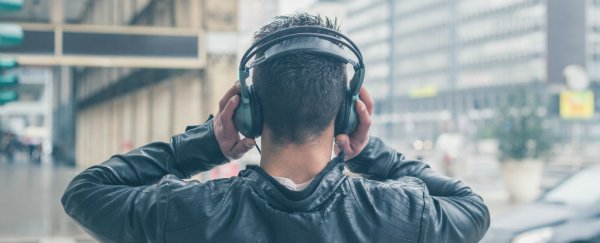Headphones that stimulate the release of dopamine in your brain and reportedly make you feel high as hell have been invented by Florida-based tech company, Nervana, and are set to go on sale as early as next month.
The headphones will pump music into your ears as normal, but at the same time, an integrated device will deliver a low-power electrical signal through your ear canal to stimulate the Vagus nerve - a nerve that runs from the brainstem to the abdomen and plays a role in the release of dopamine, a neurotransmitter that helps control the brain's reward and pleasure centres.
"I felt the electricity go into my arm, and everything was tingling there, but the best moment for me was afterwards when I finished and stood up," journalist Amanda Gutterman writes for Futurism.
"I felt like I reached a personal high point. I couldn't stop smiling or laughing. I was like, 'Oh wow'. For about 5 minutes, my happiness level was a 10 out of 10. Then it got foggier, but I was still unusually happy for about an hour."
According to Nervana, the headphones don't just deliver these electrical signals indiscriminately - the technology analyses the audio signal coming out of your music player, and then syncs up the signals to the beats.
Or if you select "ambient mode", the signals will sync up with the sounds in your environment, which means you can go to a concert and sit up the back and get high to the music - legally.
Now, it must be said that the claims surrounding these headphones have not been peer-reviewed, and the company has not published any background research that went into its development. So as to whether or not these things truly deliver on what they promise, we can't be sure. But if the technology is legit, it sounds like a pretty good way to while away a Sunday afternoon.
As Jon Levine reports for Mic, the headphones will set you back US$299, and are expected to go on sale next month. And if you're interested in using them 'on the go', you'd better be prepared to cart around a chunky generator - it'd basically be like carrying one iPhone for your music, and another one for your electrical signals.
But whatever you do, just don't listen and drive: "[We're] not going to recommend driving, certainly not while using it," Nervana co-founder and CEO Ami Brannon told Mic, adding that while she was confident there was no impairment to brain function (you'd hope not), the official advice is to stay off the road for at least 30 minutes after use.
If someone wants to volunteer to be the guinea pig and fork out a few hundred dollars to see if they actually work, that'd be great. Because they sure sound like a whole lot of fun.
